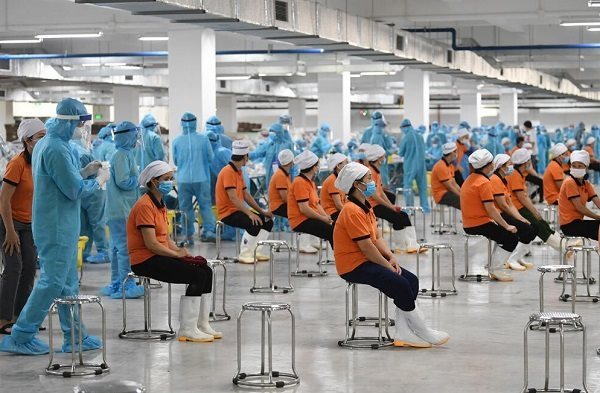
After one month of letting their workers stay at work, many businesses in southern Vietnam are seeking approval from the authorities to allow their employees to return to their own residences.
After one month of letting their workers stay at work, many businesses in southern Vietnam are seeking approval from the authorities to allow their employees to return to their own residences.
Their request comes as their employees have expressed their unwillingness to continue staying at the factories after work because no early end to social distancing is in sight.
 |
| A view of a Covid-19 testing site. After one month of complying with the stay-at-work requirements, many businesses in the south have sought approval from the authorities to get back to normal – PHOTO: VGP |
The provincial government of Dong Nai on August 5 issued an urgent dispatch, giving guidelines to businesses that have requested to end the implementation of two operation arrangements required for enterprises in virus-hit areas.
According to the first stay-at-work arrangement, companies have to make preparations for their employees to work, eat and sleep on their premises to prevent Covid-19 from spreading during the ongoing stay-at-home mandate.
As for the second arrangement named “one route, two locations”, employers must arrange shuttle buses to transport their workers between their concentrated housing facilities and their factories.
The provincial government asked businesses that wished to end the stay-at-work arrangement to send their requests to the provincial Department of Labor, Invalids, and Social Affairs and the Dong Nai Industrial Zones Authority. Once being approved, enterprises have to conduct Covid-19 tests for all employees.
Employees are only allowed to leave their companies after they tested negative for the coronavirus and were permitted to return home by their local district-level authorities.
To stop the stay-at-work or “one route, two locations” arrangements, businesses have to ensure that all of their employees test negative for the virus. If any of the employees tests positive, the firm must not let them leave its facility without prior permission from authorities.
Employers must take full responsibility before the law if they allow any employee to return home without complying with the above-mentioned regulations or allow them to leave their facilities without authorities’ permission.
Similarly, the authorities of Tan Uyen Town in the neighboring province of Binh Duong recently sent a dispatch to enterprises that wanted to end the stay-at-work arrangement. Some 1,000 firms in the town are operating under this arrangement.
The authorities of Tan Uyen Town asked these enterprises to do the Covid testing for all employees before allowing them to return to their residences. The town demanded that all of the workers have a negative Covid-19 test result to be eligible to get home.
Regarding the issue, the Binh Duong Provincial Party Committee also asked businesses to strictly follow one of the two operation arrangements. Failing to do so, they would be forced to suspend their operations. Local authorities and the provincial Industrial Zones Authority have to coordinate with suspended businesses to screen workers to ensure that they are free of Covid when they return to their residences.
In HCMC, Le Viet Hai, chairman of the Saigon Construction and Building Material Association, also wrote to the prime minister, proposing to change the two operation arrangements.
Hai said that the two operation arrangements have yet to prove effective as enterprises are facing huge obstacles in terms of finance and resources. The arrangements have not helped them to prevent the spread of the disease. These arrangements have slowed down manufacturing activities and transport of goods, thus affecting the fulfillment of orders with customers.
(Source:Saigontimes)





